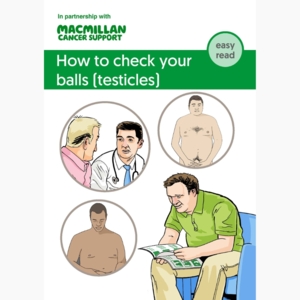How to check for testicular cancer
Regularly checking your testicles from puberty onwards can help find a testicular cancer earlier, when it is easier to treat.
How do I check for testicular cancer?
From puberty onwards, it is important to check for any changes in the testicles regularly. It is usually possible to cure testicular cancer. But it is easier to treat when it is diagnosed early.
Checking for testicular cancer is sometimes called testicular self-examination. Doing this regularly means you will soon get to know what feels normal for you. A normal testicle should feel smooth and firm, but not hard.
It can be easier to check the testicles during, or right after, a warm bath or shower when the scrotal skin is relaxed. Hold the scrotum in the palm of your hand. Use your fingers and thumb to examine each testicle. You should feel for:
- lumps or swellings
- anything unusual
- differences between the testicles.
It is normal for the testicles to be slightly different in size. It is also normal for one to hang lower than the other.
The epididymis (tube that carries sperm) is behind the top of each testicle. It feels like a soft, coiled tube. It is common to get harmless cysts or benign lumps in the epididymis. The treatment for these can vary.
Booklets and resources
Visiting a doctor
Other conditions can cause lumps or swellings, and most lumps are not cancer (non-cancerous). But it is important you get your doctor to check anything unusual as soon as possible.
Doctors are used to dealing with problems like this. If you feel embarrassed about talking to your GP, you can go to your local sexual health clinic. You can find your nearest clinic on the NHS website.
Trans and non-binary people
If you are a trans woman and have testicles, you may feel uncomfortable or upset about checking this part of the body. Talking to a healthcare professional about your body may also be especially difficult and complicated.
Try not to let this stop you checking regularly. It is important to get any changes checked. If you are not able to talk to your GP or local sexual health clinic, you can also contact a:
- gender identity clinic, if you attend one
- sexual health and well-being service that is trans and non-binary friendly. You can check if this is available in your area on Tranzwiki.
About our information
-
References
Below is a sample of the sources used in our testicular cancer information. If you would like more information about the sources we use, please contact us at cancerinformationteam@macmillan.org.uk
The British Association of Urological Surgeons (BAUS) Guidelines on Testicular Cancer. March 2015. Available from: https://www.baus.org.uk/professionals/sections/testicular_cancer.aspx (accessed April 2022).
European Association of Urology (EAU) Guidelines on Testicular Cancer 2022. Available from: https://d56bochluxqnz.cloudfront.net/documents/full-guideline/EAU-Guidelines-on-Testicular-Cancer-2022.pdf (accessed April 2022).
European Society for Medical Oncology (ESMO). Testicular seminoma and non-seminoma: ESMO Clinical Practice Guidelines for diagnosis, treatment and follow-up. Last updated 2022.
European Society for Medical Oncology (ESMO). Testicular seminoma and non-seminoma: ESMO Clinical Practice Guidelines for diagnosis, treatment and follow-up. Last updated 2022. Available from: https://www.annalsofoncology.org/article/S0923-7534(22)00007-2/fulltext (accessed April 2022).
-
Reviewers
This information has been written, revised and edited by Macmillan Cancer Support’s Cancer Information Development team. It has been reviewed by expert medical and health professionals and people living with cancer. It has been approved by Senior Medical Editor, Dr Ursula McGovern, Consultant Medical Oncologist.
Our cancer information has been awarded the PIF TICK. Created by the Patient Information Forum, this quality mark shows we meet PIF’s 10 criteria for trustworthy health information.
The language we use
We want everyone affected by cancer to feel our information is written for them.
We want our information to be as clear as possible. To do this, we try to:
- use plain English
- explain medical words
- use short sentences
- use illustrations to explain text
- structure the information clearly
- make sure important points are clear.
We use gender-inclusive language and talk to our readers as ‘you’ so that everyone feels included. Where clinically necessary we use the terms ‘men’ and ‘women’ or ‘male’ and ‘female’. For example, we do so when talking about parts of the body or mentioning statistics or research about who is affected.
You can read more about how we produce our information here.
Date reviewed
This content is currently being reviewed. New information will be coming soon.

Our cancer information meets the PIF TICK quality mark.
This means it is easy to use, up-to-date and based on the latest evidence. Learn more about how we produce our information.




